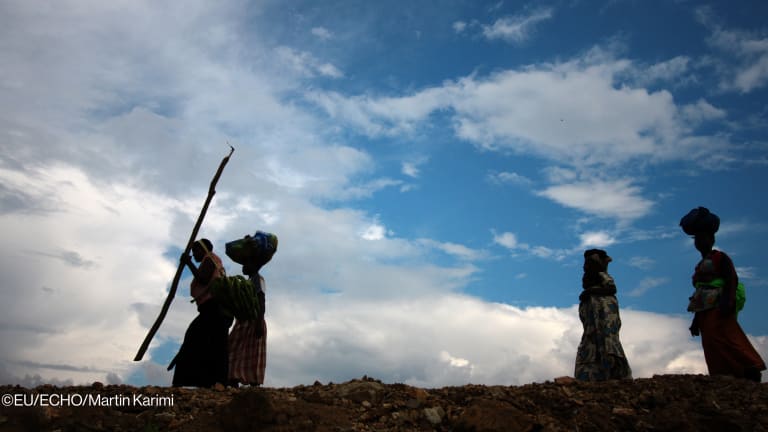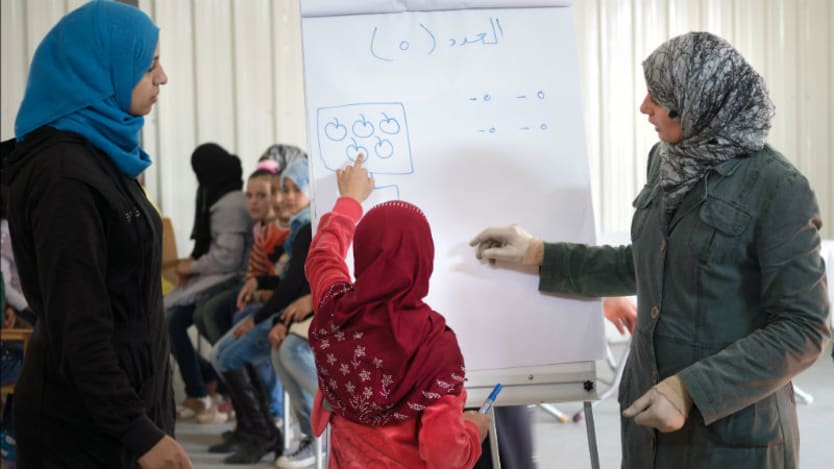
The latest figures from the United Nations refugee agency show yet another increase in the number of people who have been forced to leave their homes, seeking protection from violence or persecution.
There are now 25.4 million refugees who have fled their country — 2.9 million more than in 2016, and the largest increase UNHCR has ever seen in a single year. More than half the world’s refugees are children, and some 3.7 million of them have not only lost their homes but their opportunity to go to school.
More on education:
► Pre-primary education spending is a 'blind spot' for aid
► 3 tips to design education programs for roving and displaced communities
Why is that?
Discrimination and deliberate exclusion have played a part. Refugee education has long struggled to draw attention on the global stage, caught between opposing perceptions of the refugee crisis as a short-term humanitarian problem, and education as a long-term development solution.
People who have fled their country don’t care about the technicalities of the aid system — they’ve heard enough excuses. They just want to send their children to school. As well as offering hope, knowledge, and skills for the future, education provides a safe space, a sense of normality and protection — from conflict but also from trafficking, child marriage, sexual exploitation, and forced labor, to which refugee children are particularly at risk.
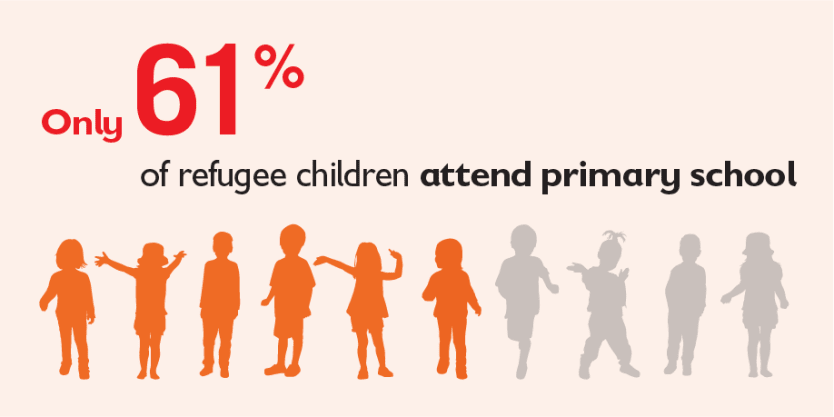
It doesn’t have to be this way, and this year poses some real opportunities to unlock education’s unique power to help refugees — but only if we nail down exactly how we are going to do it and where the money is going to come from.
In our new report on refugee education, we propose a global plan of action to get every refugee child into school. It shows that we could deliver quality universal preprimary, primary and secondary education to the world’s refugees, for $21.5 billion over five years — or $575 per child per year.
Countries hosting refugees perform a global public good for the international community as a whole and should be supported in doing so. However, not all countries require the same level of support, so our costings propose different levels of support for refugee education, in line with national capacity.
Low-income countries receive 95 percent of the required amount, lower-middle-income countries 80 percent, and upper-middle-income countries 40 percent.
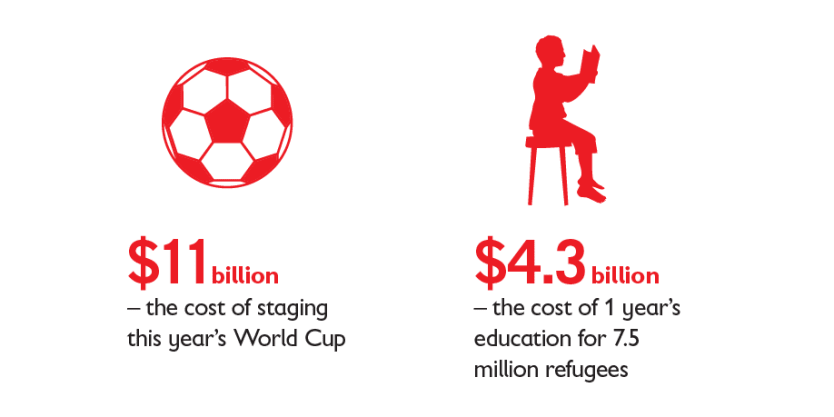
Applying this formula, $11.9 billion would be needed in international assistance, or $4.3 billion per year. To put this into perspective, the 2018 World Cup cost $11 billion to stage, so although the figures look large, they represent a relatively modest investment which could reap massive benefits.
In addition to much needed investment, our proposal calls for policy and practical change to include refugees in the education systems of their host countries, and concerted efforts to improve the quality of learning on offer.
Inclusion of refugees in national systems
Including refugee children in the education system of their host country is the most practical and sustainable way to provide displaced children with accredited and certified learning opportunities that can be monitored for quality.
Some countries lack the necessary resources and political will to make this happen, and some even take political decisions to obstruct the education of certain groups. Of the 25 hosting countries regarded as highest priority by UNHCR, only 16 allow refugees full access to their education systems at primary and secondary level.
Improving the quality of education on offer
Improving the quality of refugee education is also crucial. Many refugee children are receiving mediocre education. This is jeopardizing their development, learning, and well-being — and leading to high dropout rates.
The education needs of refugee students are complex. They may have already missed years of schooling and be unfamiliar with the local curriculum and language of instruction. Many displaced children have experienced severe trauma and require psychological support. Girls are disproportionately affected by crises. Refugee girls — particularly adolescents — are two and a half times more likely to be out of school.
“Refugee education has long struggled to draw attention on the global stage, caught between opposing perceptions of the refugee crisis as a short-term humanitarian problem, and education as a long-term development solution.”
—Investment
Serious investment in refugee education is a vital global obligation that has long been neglected — in part because of the deadly artificial divide between humanitarian and development aid.
Many of the education systems in the 10 countries that host the most refugees worldwide are weak and receive little support from the international community. In only two of these countries, education received more than 2 percent of humanitarian financing in 2016. This level mirrors the humanitarian sector in general, where only 2.7 percent is directed toward education.
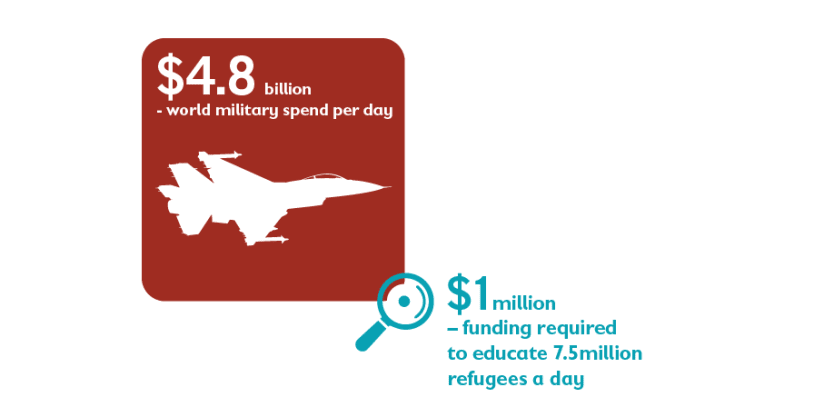
Despite the lack of funding for education in emergencies, there are some promising developments. The EU is committed to spending 10 percent of its humanitarian budget on education and Education Cannot Wait is now up and running and is supporting the development and funding of multiyear education programs in emergency and refugee situations.
“Time to act” identifies opportunities to tap into new sources of finance and sets out how donors and the international aid architecture can prioritize the needs of refugee children more effectively.
The time to act is now
We share a collective obligation to the 3.7 million refugee children who are not in school. Having already lost their homes, they are now losing their education. They are not responsible for the conflict that has driven them out of their country. And they have a legal right to an education – a right that doesn’t end in times of emergency.
We’re confident that it is possible to provide a quality education to every last refugee child. The Global Compact on Refugees offers a unique opportunity to realize this vision.
Between now and when the international community meets at the UN General Assembly in September, we are trying to grow support for focussed collective action to begin to deliver the Global Compact’s promises on education.
Together with UNHCR, UNICEF, UNESCO, World Bank, Global Partnership for Education, and Education Cannot Wait, we are planning a high-level meeting designed to sustain and grow public support and political will for inclusive, quality education back by additional funding for the countries that need it most.
The futures of millions of children are depending on us to stop prevaricating. We have to make sure that becoming a refugee doesn’t mean losing the right to get an education.





